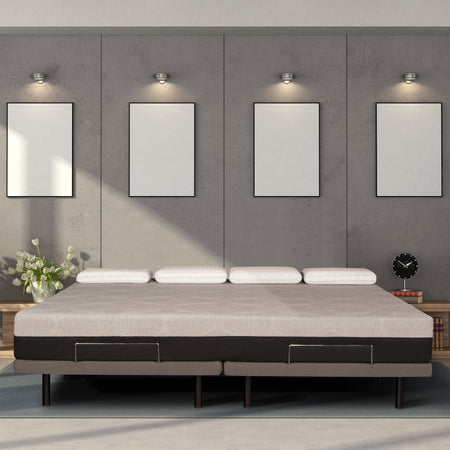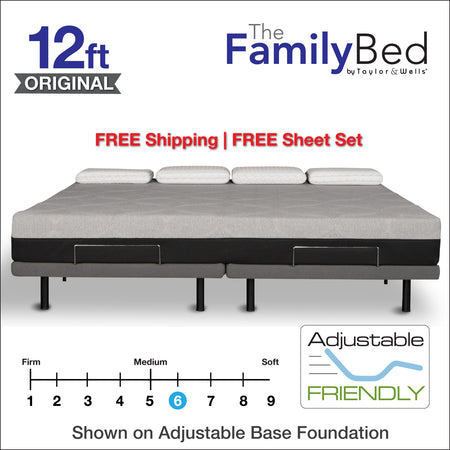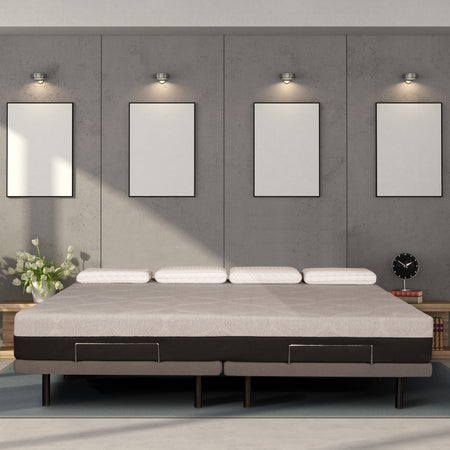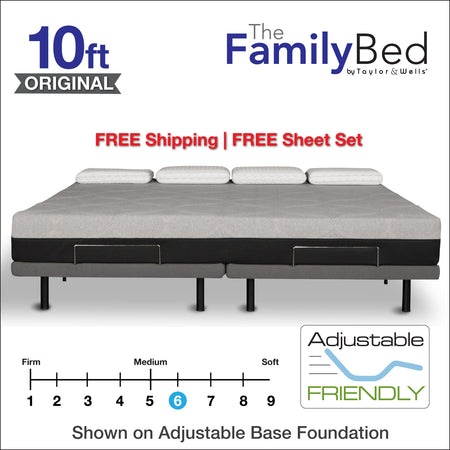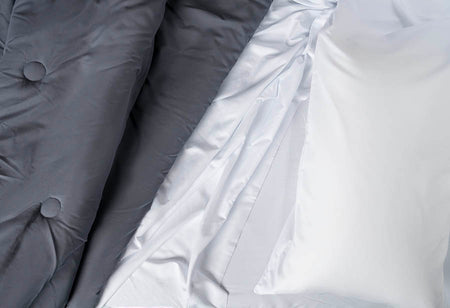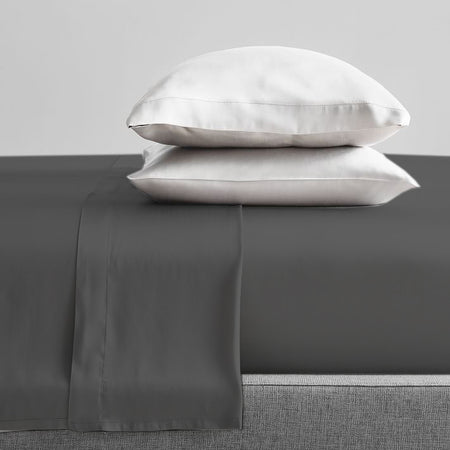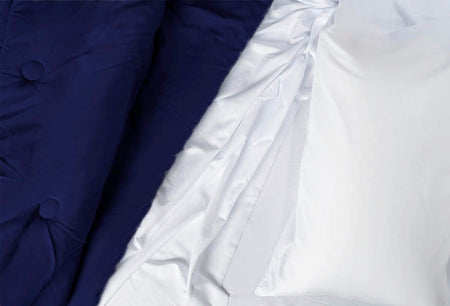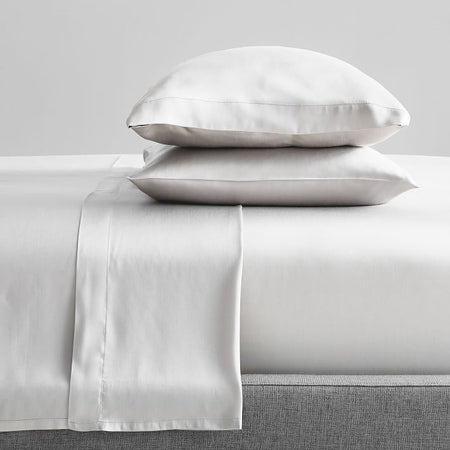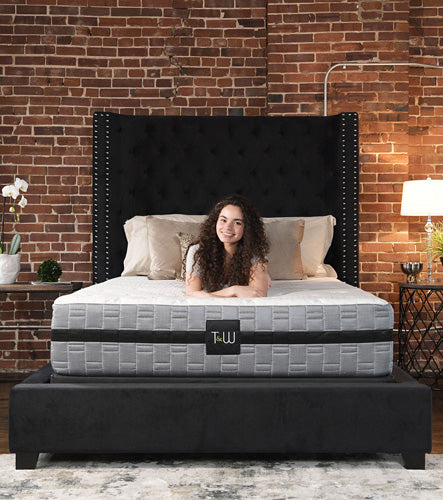A good night's sleep is essential for our overall health and well-being, and a key factor in achieving that is having a comfortable and supportive mattress. Over time, mattresses undergo wear and tear, decreasing their ability to provide adequate comfort and support. But how do you know when it's time to replace your mattress?
This guide aims to help you recognize the telltale signs that indicate your mattress is no longer serving its purpose. By being aware of these signs, you can decide when to replace your worn-out mattress, ensuring you continue to enjoy a restful sleep.
Typical Lifespan of a Bed
According to Sleep Foundation, most mattresses last between 7 and 10 years. But variables like materials, mattress quality and type, sleep position, and body weight all play a role in determining how long your mattress will provide you with the best sleep of your life. For example, high-quality beds incorporating durable and resilient components are less likely to experience early wear and tear. Mattresses crafted with top-notch materials tend to maintain their structural integrity for more extended periods, offering better support and comfort level over time.
Common Signs of Mattress Deterioration

Here's how to know it's time to replace a mattress:
Sagging and Indentation
Sagging is a common issue as a mattress ages. Over time, the materials in the mattress compress and lose their ability to bounce back, leading to visible indentations. Sleeping on a sagging mattress can negatively affect your spine alignment and lead to discomfort, stiffness, and even back pain. So, when you notice any of the following signs, it's time to replace your old mattress:
- Obvious sinking or depressions on the mattress surface, mainly where you sleep, sit, or rest most often.
- A noticeable decrease in comfort and support leaves you waking up with aches and pains.
- Uneven surface: Feeling like rolling into a central groove or slope on the mattress.
- Increased tossing and turning during the night, as your body struggles to find a comfortable position due to the uneven surface.
Discomfort and Pain
If you wake up with body aches or stiffness, it could be a sign that your mattress no longer provides the support your body needs. As the materials break down, the mattress becomes less capable of cushioning pressure points and distributing your weight evenly. This leads to poor spinal alignment, discomfort, and pain. Consider replacing your mattress when you:
- Consistently wake up with body aches, especially in areas like the back, neck, hips, or shoulders, as your mattress might not provide the support your body needs.
- Feel stiff when you wake up, as this shows your mattress doesn't correctly contour to your body or maintain your spinal alignment.
- Experience a stiff neck after sleeping. This can result from poor support and alignment provided by your mattress.
- Are tossing and turning to alleviate discomfort while you sleep,
In many cases, this pain, discomfort, and stiffness tend to diminish throughout the day. If you wake up with soreness or pain but feel okay by midmorning or afternoon, you may want to replace your mattress.

Allergies and Hygiene Issues
Older mattresses can harbor allergens such as dust mites and mold, negatively impacting indoor air quality and exacerbating allergies. If you notice an increase in allergy symptoms or if your mattress has visible signs of mold or stains that can't be removed, it's time to consider a replacement.
Noises and Motion Transfer
As your mattress ages, it might produce creaking, squeaking, or even loud popping noises when you shift or move on it. While some noise can be expected, persistent and disruptive sounds indicate that the internal components of the mattress, such as the springs or coils, might be deteriorating. And this deterioration doesn't just lead to annoying noises but also motion transfer.
Motion transfer means that when you or your partner moves, the motion can be felt more on the other side of the bed. Noise and motion transfer might disrupt your sleep and affect your partner's sleep quality. If you're constantly waking each other up due to these disturbances, it's a sign that your mattress no longer provides the isolation and support needed to ensure a restful night's sleep.
Insomnia and Restlessness
A good mattress is about physical comfort and promoting healthy sleep patterns. If you struggle with insomnia or restlessness, your mattress could be a contributing factor. On average, it takes about 10 to 20 minutes to fall asleep – taking longer than this can decrease your sleep quality.
Sleep is essential for physical and mental recovery, and inadequate sleep can lead to daytime fatigue, decreased cognitive function, mood disturbances, and a weakened immune system. Consider getting a new mattress if you're having difficulty falling or staying asleep and don't have other underlying issues like anxiety.
Sleep-Related Health Issues
Consistently poor sleep quality due to an inadequate mattress has been linked to various health issues, including compromised immune function, weight gain, and cardiovascular problems. Addressing the mattress-related factors can contribute to better sleep and improved overall health.
Partner Preferences
Sharing a bed with a partner might require compromising on mattress firmness and support. If your partner's preferences have changed or you have different support needs, it could be a good opportunity to consider a mattress that suits both of you.
Difficulty in Cleaning
As mattresses age, they become more challenging to clean thoroughly. Accumulated stains, odors, and deep-seated dirt can compromise mattress hygiene. If your mattress is no longer responding well to cleaning efforts, it might be time to replace it.
Wear and Tear
Visible wear and tear, such as frayed edges, loose threads, and visible springs, are indicators that your mattress is past its prime. These signs affect not only the aesthetics but also the bed's structural integrity.
Health Implications of Sleeping on an Old Mattress

Your mattress plays a pivotal role in determining the quality of your sleep, and sleeping on an old, worn-out mattress can have significant health implications beyond just comfort.
Impact on Sleep Quality
An old mattress that no longer provides adequate support and comfort can lead to sleep disturbances. As you toss and turn in search of a comfortable position, your sleep becomes fragmented, preventing you from reaching the deep, restorative sleep stages. This, in turn, can result in daytime fatigue, reduced alertness, and impaired cognitive function.
Musculoskeletal Issues
Sleeping on a mattress that has lost its ability to support your body correctly can contribute to musculoskeletal problems. Improper spine alignment due to sagging or lack of support can lead to chronic back pain, neck pain, and stiffness.
Allergies and Respiratory Issues
Mattresses can accumulate dust mites, allergens, and even mold as they age. Breathing in these allergens night after night can exacerbate allergies, trigger asthma symptoms, and lead to respiratory problems, especially for those sensitive to airborne irritants.
Skin Irritations and Infections
An old mattress can also harbor bacteria and fungi due to accumulated sweat, dead skin cells, and moisture. This can lead to skin irritations, rashes, and even infections, particularly if you have sensitive or compromised skin.
Compromised Immune System
Consistently poor sleep quality due to an uncomfortable mattress can weaken your immune system, making you more susceptible to illnesses and infections. Quality sleep is essential for your body to regenerate, repair, and fight off pathogens effectively.
Replace your Mattress at the Bedding Mart
When considering a new mattress, The Bedding Mart is a reliable source for a range of top-notch bedding solutions that prioritize comfort and health. At The Bedding Mart, you'll find a diverse selection of mattresses designed to cater to different preferences and needs. Whether you're seeking memory foam, innerspring, or hybrid options, we offer a variety of choices to suit various sleep styles.


